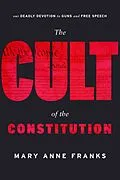"Apowerful challenge to the prevailing constitutional orthodoxy of the right and the left... A deeply troubling and absolutely vital book" (Mark Joseph Stern, Slate).
In this provocative book, Mary Anne Franks examines the thin line between constitutional fidelity and constitutional fundamentalism. The Cult of the Constitutionreveals how deep fundamentalist strains in both conservative and liberal American thought keep the Constitution in the service of white male supremacy.
Franks demonstrates how constitutional fundamentalists read the Constitution selectively and self-servingly, thus undermining the integrity of the document as a whole. She goes on to argue that economic and civil libertarianism have merged to produce a deregulatory, "free-market" approach to constitutional rights that achieves fullest expression in the idealization of the Internet. The fetishization of the first and second amendments has blurred the boundaries between conduct and speech and between veneration and violence.
But the Constitution itself contains the antidote to fundamentalism. The Cult of the Constitutionlays bare the dark, antidemocratic consequences of constitutional fundamentalism and urges readers to take the Constitution seriously, not selectively.Autorentext
Mary Anne Franks is Professor of Law at the University of Miami School of Law and President and Legislative & Tech Policy Director at the Cyber Civil Rights Initiative (CCRI). Franks' writing and research have been featured in Time, The New Yorker, The Atlantic, and The Guardian, among other outlets.
Klappentext
In this controversial and provocative book, Mary Anne Franks examines the thin line between constitutional fidelity and constitutional fundamentalism. The Cult of the Constitution reveals how deep fundamentalist strains in both conservative and liberal American thought keep the Constitution in the service of white male supremacy.
Constitutional fundamentalists read the Constitution selectively and self-servingly. Fundamentalist interpretations of the Constitution elevate certain constitutional rights above all others, benefit the most powerful members of society, and undermine the integrity of the document as a whole. The conservative fetish for the Second Amendment (enforced by groups such as the NRA) provides an obvious example of constitutional fundamentalism; the liberal fetish for the First Amendment (enforced by groups such as the ACLU) is less obvious but no less influential. Economic and civil libertarianism have increasingly merged to produce a deregulatory, "free-market" approach to constitutional rights that achieves fullest expression in the idealization of the Internet. The worship of guns, speech, and the Internet in the name of the Constitution has blurred the boundaries between conduct and speech and between veneration and violence.
But the Constitution itself contains the antidote to fundamentalism. The Cult of the Constitution lays bare the dark, antidemocratic consequences of constitutional fundamentalism and urges readers to take the Constitution seriously, not selectively.
Inhalt
This introduction presents an overview of the book using the 2017 "Unite the Right" demonstration in Charlottesville, Virginia. In Charlottesville, assault rifles mingled with the swastikas and Confederate flags of the demonstrators, who had found one another and organized the event through Internet forums. The protest was a dramatic illustration not only of collisions between the First Amendment and the Second Amendment, but also the role of the Internet in radicalization and coordination of violent white male supremacists. In chanting "you will not replace us," the protesters made clear that America and its Constitution belonged to white men. Although high-profile figures on both the left and the right condemned the protest as "not who we are" as Americans, the protesters revealed an uncomfortable truth.
Cults promise to provide deeper meaning and rely on their ideology to justify exploitation of the weak. The framers used the egalitarian rhetoric of the Constitution to disguise the white male elite's economic, sexual, and political exploitation of women and slaves. The cult of the Constitution is kept alive through ritualized invocations of the founding fathers and the Constitution. Ignoring the totality of the document, constitutional fundamentalists focus on isolated "superrights" that become inextricable from their sense of self. For conservative fundamentalists, that superright is often the right to bear arms; for liberal fundamentalists, it is the right to free speech. The confluence of intense, constitutionally inflected attachment to guns, speech, and the Internet has blurred the boundaries between conduct and speech, and veneration and violence. It has intensified the perception of white male victimization such that harm to others is increasingly perceived as justified.
Chapter 2 explores the appeal of the Second Amendment to conservative constitutional fundamentalists. The most ardent defenders of the individual right to bear arms tend to believe in strict social hierarchies reinforced by rigid gender roles, belief in racial superiority, and distrust of government. The NRA's insistence to its followers that the government is coming to take their guns cultivates a collective paranoia and persecution complex among gun owners that spills over into other social issues, from religious freedom to political correctness to women's reproductive rights. Second Amendment fundamentalism promotes an interpretation of self-defense that benefits the powerful while endangering the most vulnerable members of society. This fundamentalism is demonstrated by the tendency of Second Amendment fundamentalists to rally behind neighborhood vigilantes and police officers, but not the victims of domestic violence, racial harassment, or police brutality.
Chapter 3 focuses on First Amendment fundamentalism. It assesses the historical influence of the ACLU in shaping both political and social understandings of free speech along with the more recent rightward shift in First Amendment practice and application. The left<->right First Amendment alliance has helped transform free speech doctrine from a shield protecting the most vulnerable to a sword for the most privileged and powerful members of society. Liberal and conservative constitutionalist views have converged on topics ranging from revenge porn to commercial and corporate expression to campus speech. This convergence has deepened existing inequalities in the free speech and other constitutional rights of women and racial minorities.
Chapter 4 details the role of the Internet in exacerbating the worst excesses of leftwing and rightwing fundamentalism, which has helped push constitutional fundamentalism in an increasingly violent and overtly white male supremacist direction. The law resp…
